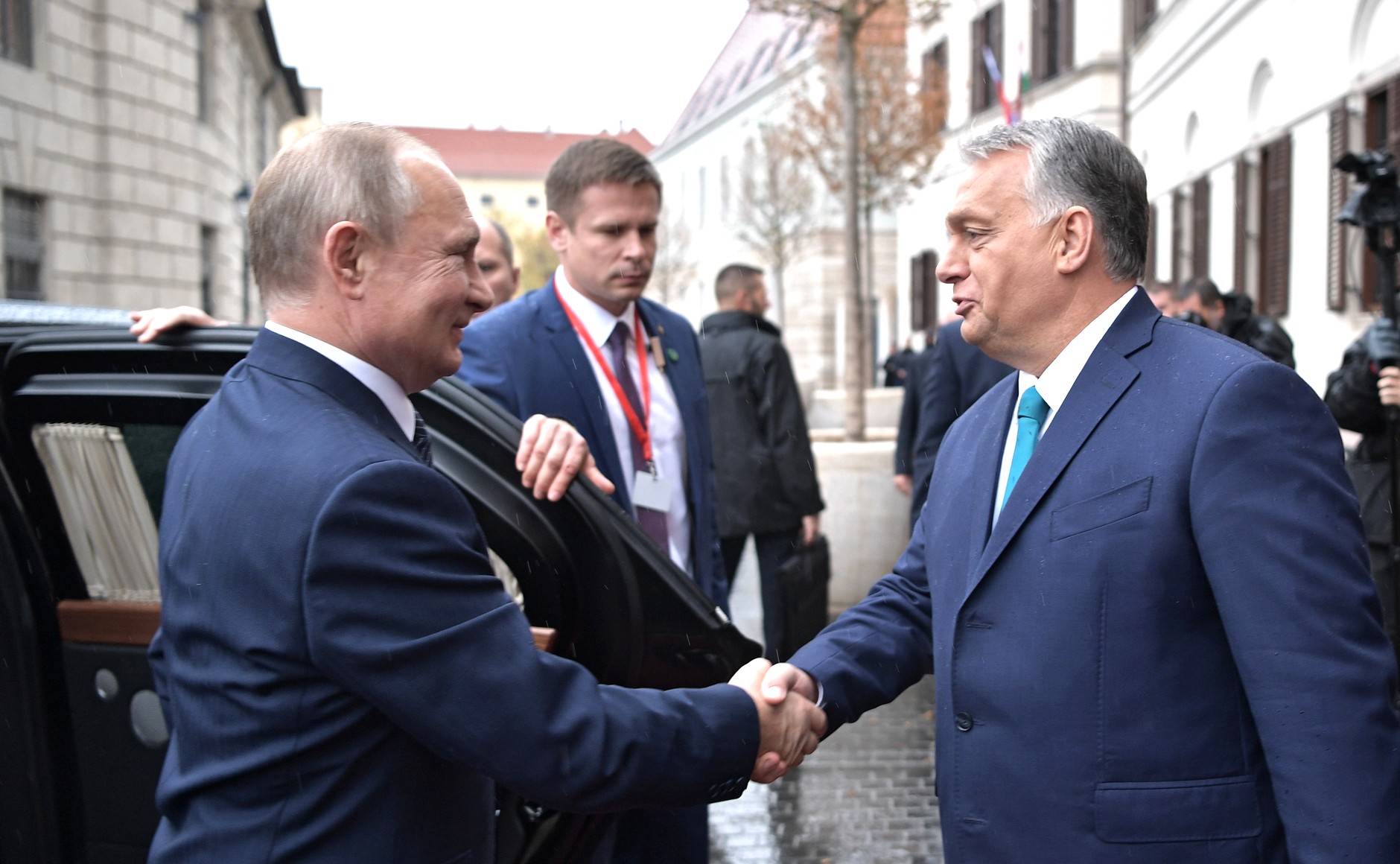Hungary Maintains Course on Russia One Year after the Invasion of Ukraine
The Hungarian government, although in principle not blocking Allied support for Ukraine, represents a position favouring Russia. This is contrary to the strategic interests of NATO and EU partners, including Poland, and results in a growing loss of credibility of the Hungarian government in these organisations. Therefore, Hungary’s attitude will degrade its position, regardless of the resolution of the war in Ukraine. It may also hinder joint action within NATO and the EU, given their limited influence on the Hungarian government’s decisions.
 NACHO DOCE / Reuters / Forum
NACHO DOCE / Reuters / Forum
Hungary’s Unchanging Approach to Russian Aggression
Since the beginning of the Russian invasion of Ukraine, Hungary has represented an unchanging position towards the conflict and its parties, which in effect favours Russia. The government maintains close diplomatic relations with Russia and wants to continue economic cooperation with it. Hungary has not developed a plan to gradually cut off Russian energy resources and even dispatched Foreign Minister Péter Szijjártó several times to negotiate supplies in Russia in 2022. In February 2023, he also visited Minsk, Belarus, where he discussed with its foreign and economic ministers the situation in Ukraine and the possibilities of enhancing bilateral economic cooperation.
Hungary does not support Ukraine politically, nor does it provide it with military equipment, only military medical training for Ukrainians. It also sends humanitarian aid worth about
HUF 3.5 billion (about €8.8 million), mainly to western Ukraine. The government has made Ukraine’s rapprochement with NATO and the EU conditional upon improving the situation of the Hungarian minority living in Transcarpathia. It is also critical of the Allies’ military equipment deliveries, accusing them of deliberately prolonging the conflict. However, Hungary also does not oppose joint decisions in this regard. No government representative has visited Kyiv since the start of the Russian invasion (President Katalin Novák attended a food security summit in the Ukrainian capital in November 2022, together with the prime ministers of Belgium, Lithuania, and Poland). As a result, Ukrainians perceive Hungary as the most unfriendly country towards them, after Russia and Belarus.
In the EU and towards its allies, Hungary acts ambivalently. It has supported all sanctions packages, but sometimes agreed to them upon receiving exemptions or has blocked some elements of them. For example, it tried to remove some names from the sanctions list, effectively in the case of Patriarch Kirill, under the threat of vetoing the sanctions package. At the same time, the government argues that sanctions are ineffective and calls for lifting them. It also opposes further restrictions in the field of energy. It also claims that the Hungarian authorities cannot arrest Vladimir Putin, as ordered by the International Criminal Court (ICC), if he appeared in Hungary because the country has not incorporated the Rome Statute of the ICC in its legal system (although it has ratified it), due to “incompatibility” with the Hungarian constitution.
Orbán frequently makes anti-Western statements and questions the legitimacy of transatlantic institutions. He lists EU institutions and U.S. President Joe Biden among his opponents. He suggests that the West, minus Hungary, which, according to him, is the only one on the side of peace, by supporting one of the warring parties is “pursuing economic interests” and “reorganising the balance of power in Europe”. He finds evidence of this in the “American involvement in European affairs on the back of the Ukrainians”. To counter this, the solution according to Orbán would be a “European NATO”, without the U.S. This rhetoric deprecating NATO is accompanied by the delaying (together with Turkey) of the ratification of Sweden’s accession to the Alliance by postponing, once again this March, the parliamentary vote on the issue. Hungary also delayed the ratification of Finland’s membership until 27 March.
Reasons for Favouring Russia
Orbán’s consistent pro-Russian and anti-Western stance may have a few, complementary reasons. The first concerns economic considerations. Hungary strengthened its relations with Russia after 2010, especially in the field of energy, and wants to continue this cooperation despite the war and, ultimately, also after it. The country considers it rational to continue to receive Russian energy resources, based on the assumption that they are and will remain the cheapest (although this is contradicted by the fact that in 2022, Hungary bought gas from Russia at a price 16% higher on average than from other sources). Such a mercantile approach putting economic interests ahead of security interests has been characteristic of the Hungarian government’s actions for more than a decade.
Another reason for Hungary’s course is the dependence of Orbán’s position in domestic politics on the chosen foreign policy direction. After years of strengthening ties with Russia, he cannot now make a political turnaround in the aftermath of the Russian aggression, in order not to lose credibility with voters. His pro-Russian profile and criticism of strengthening transatlantic ties and EU institutions have become part of his political brand. He makes an asset out of regularly opposing the majority position in the EU and NATO. Restricting Community and Alliance activities or demonstrating a separate stance has remained his only instrument of influence, albeit ever less powerful, on the international situation.
Also, Orbán may have made the choice to favour Russia’s interests because it was in line with his personal views. This is indicated by his statements. While he condemned the Russian aggression, before the war he repeatedly mentioned Russia as a positive example of a functioning state and a desirable partner. Moreover, the Hungarian prime minister has several times explained his calculations in public, which, in his view, are that it is impossible for Russia, which is a nuclear power, to lose this armed conflict. According to Orbán, Hungary should assume the role of intermediary between Russia and the West. He may also assume that with time the West will soften its approach to Russia and Hungary will then be in a stronger position vis-à-vis it.
Consequences for Allies
In assessing the international significance of Russia’s aggression against Ukraine, Hungary identifies with, in Szijjártó’s words, the “global majority peace camp”, formed by, for example, “the Turkic states, China, India, or Brazil”. The government considers the war in Ukraine a “regional conflict”. It is therefore unwilling to side with states for which a Ukrainian victory is crucial to preserving an international order based on law.
Eliminating the U.S. from European defence—a concept consistently promoted by Orbán for a decade—is in Russia’s interest and would have negative consequences for the security of Central Europe. Such views weaken the political cohesion of the Alliance. The Hungarian position also prevents high-level political cooperation within the Visegrad Group in all areas. However, as long as Hungary does not block Alliance activities and meets the minimum expectations of the Alliance, it is only treated as a difficult partner. On the other hand, it cannot be ruled out that Hungary will start to resort to more drastic instruments, including making unanimous decisions impossible. This will create a real problem for the Allies, which (including even the U.S.) may not have effective instruments to influence Hungary in such a case.
Conclusions
Hungary has consistently pursued a pro-Russian policy for years, and this has not changed with Russia’s full-scale invasion of Ukraine. The Hungarian government is the only NATO and EU member that has not taken bilateral actions to bring Ukraine closer to victory.
Measures taken on the basis of Hungary’s diagnosis of the international situation generate increasing political costs, while at the same time any benefits for the state are invisible. Even if developments in Ukraine were beneficial to Russia, it would not favour Hungary. Russia would threaten the EU’s security as a whole, with no particular concern for Hungary’s interests. At the same time, Hungary is losing credibility in the EU and NATO as a result of its policies.
Economic concerns, domestic political reasons, and Orbán's personal views might be interlinked at the root of Hungary’s policy assumptions towards Russia. They may equally influence the shape of this policy; however, it is important to point to the personal beliefs of the prime minister, who in the Hungarian power structure has a decisive voice. The government’s anti-Western and pro-Russian communication, which forms public opinion, is based on his rhetoric. According to the latest Eurobarometer surveys, the percentage of Hungarian respondents who think positively about the EU (39%) has fallen by 12 percentage points in the last six months. Other polls indicate that the vast majority of the public (70%) has a negative view of the sanctions imposed on Russia.
Poland and Hungary perceive the security situation differently, and they also differ in their choice of actions needed to ensure European security. This is not only a difference of opinion, but a fundamental contradiction of the two sides’ understanding of strategic interests. This significantly hinders Poland’s cooperation with Hungary beyond joint NATO and EU actions, as indicated by the limited number of bilateral consultations at the governmental level for more than a year.





